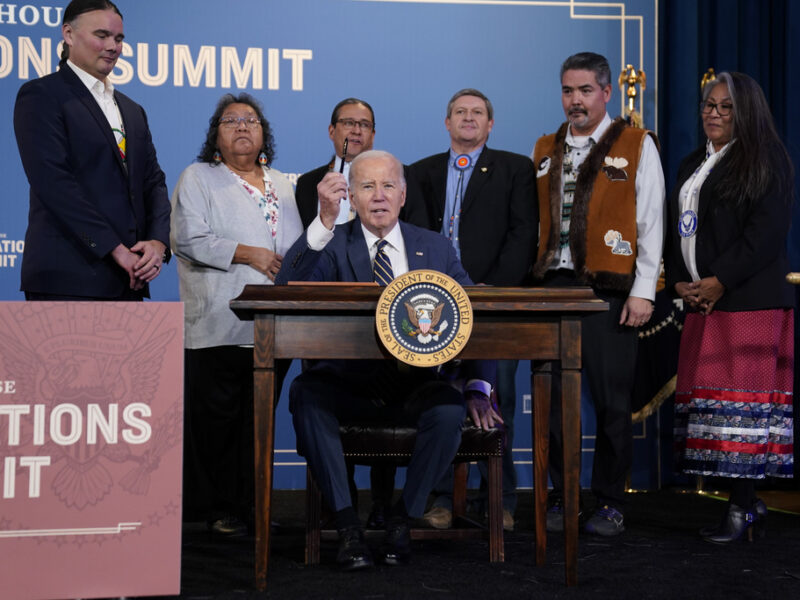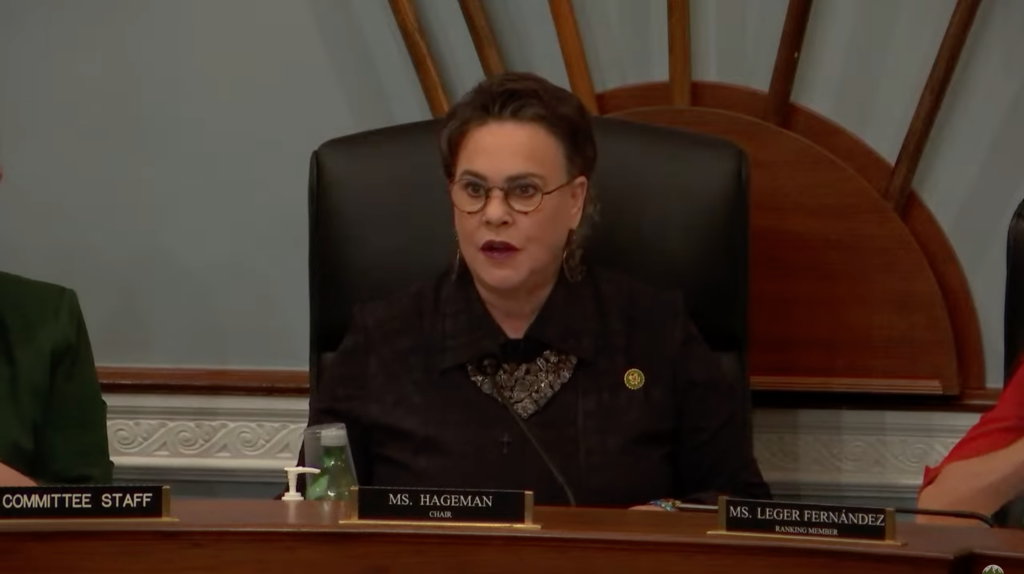Biden Pledges Greater Federal Support for Tribal Nations at White House Summit
Rep. Hageman pursuing legislative solutions for tribes, criticizes federal overreach
- Published In: Politics
- Last Updated: Dec 08, 2023

President Joe Biden signed a new executive order Wednesday directing the government to ease regulatory burdens and increase federal funding opportunities for Native American tribes. (AP Photo/Evan Vucci)
By Jacob Gardenswartz
Special to the Wyoming Truth
WASHINGTON — Appearing before a group of Native American leaders, President Joe Biden signed an executive order seeking to ease regulatory burdens that many tribes face when seeking federal funding and provide greater autonomy to tribal communities over how to use such dollars.
At the White House Tribal Nations Summit, a two-day annual gathering of tribal leaders from across the country, Biden acknowledged the atrocities Indigenous Americans have historically faced, pledging his administration would help right past wrongs.
“Indigenous communities still live in the shadows of the failed policies of the past,” Biden said Wednesday. “That’s why I committed to working with you to write a new and better chapter in American history for Indian nations.”
The new executive order directs federal officials to engage in a whole-of-government review of federal funding opportunities for Native American communities and tribes, identifying possible opportunities for further investment and streamlining application processes. It also creates an “online clearinghouse” where tribes can see all federal grant opportunities in one place, and eases reporting requirements to facilitate grant management for smaller tribes.
“There are still too many hoops to jump through, too many strings attached and too many inefficiencies in the process,” Biden said. He promised the measure would help the government “deliver for your communities faster and better.”
Also this week, Rep. Harriet Hageman (R-Wyo.) oversaw a hearing of the House Natural Resources Committee’s subcommittee on Indian and Indigenous Affairs concerning several legislative proposals to bolster tribal sovereignty, one of her key priorities.

One measure, the “Parity for Tribal Law Enforcement Act,” would authorize most tribal law enforcement officers to legally be considered federal law enforcement officers, thereby entitling them to the same pension and retirement benefits as other federal officers. If passed, federal officials and tribal leaders say the measure would help rectify a deep pay inequity between tribal law enforcement officers and other public safety officials that has exacerbated police recruitment and retention issues on reservations.
“Everyone deserves to feel safe in their community, and we will continue to work towards that goal for all native communities,” Hageman said during Tuesday’s hearing.
During a separate congressional hearing last month, Arapaho Business Council chairman Lloyd Goggles of Wyoming said such pay disparities significantly impacted law enforcement and public safety on the Wind River Indian Reservation. Due to recruitment and retention challenges, just three tribal fish and game wardens were tasked with patrolling 240 lakes, 1,100 miles of streams and 2.2 million acres of tribal lands, Goggles testified.
The Wyoming Truth has previously reported on how such law enforcement staffing shortages have led to an increase in crime on the reservation, as local officials continue to pursue legislative and community solutions.
In Tuesday’s hearing, meanwhile, Jarred-Michael Erickson, chairman of the Confederated Tribes of the Colville Reservation in Washington, said staffing shortages in his community had delayed an investigation into a recent murder there. He said the legislative proposal to enforce pay parity would provide “immediate benefits” for his tribe, urging lawmakers to approve it “quickly.”
The measure has earned bipartisan praise and support of the Department of the Interior, as well as nine Native American tribes and organizations. It is expected to be favorably voted out of committee in the coming weeks, though House Speaker Mike Johnson (R-La.) has not said whether and when he will bring it to the floor for a full vote of the House.
Hageman decries executive actions to support Native communities, favors legislation
Hageman and Biden see eye-to-eye on little. The Wyoming congresswoman is a top critic of the administration’s measures to combat climate change, frequently assails Biden’s immigration policies and is among the loudest voices in the House pushing for his impeachment.
But when it comes to tribal sovereignty, Hageman and Biden appear more closely aligned. During a congressional hearing earlier this year, Hageman criticized existing federal policies she said frequently prevent local leaders from making important decisions “without the approval of Washington bureaucrats.” Such a process “can slow or in some cases halt development for years,” Hageman argued.
Through his actions this week, Biden seemed to echo such concerns. His executive order requires federal officials to develop recommendations for the government to “take steps toward better living up to its trust responsibilities,” including identifying “budgetary, statutory, regulatory, or other changes that may be necessary” to “support Tribal Nations more effectively.”
Representatives for Hageman did not respond to multiple inquiries about her reaction to Biden’s new measures, though she did post criticism of his action on X, the site formerly known as Twitter, late Thursday evening.
Noting the House Natural Resources Committee, on which she serves, was working through several bills to support tribal nations, Hageman wrote Biden “is not a legislator and needs to stop trying to be one by issuing executive orders.”
Her post also called attention to several instances in which the White House and native communities have found themselves at odds. Though Biden has positioned himself as a leading advocate for Indigenous Americans, not every tribe has agreed with his approach.
At least three tribes in South Dakota and Montana, for example, have sued the federal government over a lack of police funding, arguing the centuries-old treaties that govern how many federal officers are assigned to each tribe must be updated to meet current needs.
Some tribes have also pushed back on the Biden administration’s efforts to curb climate change and protect lands sacred to Native communities, actions the president touted to tribal leaders on Wednesday as intended to help “preserve cultural heritage.”
One such move involved banning oil and gas leasing for 20 years within 10 miles of the Chaco Culture National Historical in New Mexico — close to sacred lands for many Native American communities within the state and in northern Arizona. While some communities celebrated the move, the president of the Navajo Nation told Fox News he was considering suing the government over the ban, citing the potential economic impacts it could inflict on his tribe.
Wyoming’s tribal leaders, meanwhile, have mostly avoided the political fray. A representative for the Northern Arapaho Tribe told the Wyoming Truth Thursday that no tribal leaders attended the White House Summit.
Officials with the Eastern Shoshone Tribe’s Business Council confirmed some members, including Vice Chairman Michael Ute, had attended, though Ute did not immediately respond to inquiries about his reactions to the event or Biden’s announcements.













